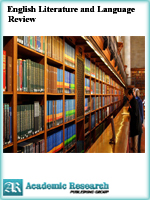English Literature and Language Review
Online ISSN: 2412-1703
Print ISSN: 2413-8827
Print ISSN: 2413-8827
Quarterly Published (4 Issues Per Year)

Archives
Volume 4 Number 4 April 2018
Gendering and Spacing the Trauma of Sexual Assault: A Father’s Story, A Daughter’s Unspeakable in J. M. Coetzee’s Disgrace
Authors: Dr. Banu Akcesme
Pages: 62-69
Abstract
Space and gender are two important factors that determine the way trauma is received and experienced. The meaning, expression and treatment of trauma should be considered in the light of cultural, historical and social conditions. John Maxwell Coetzee offers a portrayal of the socio-cultural and historical landscape with the ongoing racial conflicts inherited from the apartheid regime in the post-apartheid South Africa in Disgrace. Coetzee’s novel Disgrace can be read as an allegory of the suffering, frustration and muddle of Post-Apartheid South Africa where racial, sexual and gender politics intricately work together. The tragic history of South Africa is marked by systematic oppression, violence, exclusion, fragmentation and dispossession. This paper aims to analyze how the experience and symptoms of trauma of sexual assault are determined by the gender of the victim and the place where the offensive contact and trauma are experienced with references to the three characters in Disgrace, the father David Lurie, the daughter Lucy and the female student Melanie.
The Influence of Tpr, Gtm Methods and Linguistic Intelligence Toward the Learning Outcomes in English Dap Based (An Experimental Study at the Students of the Second Grade of Sdn Samarinda, East Borneo)
Authors: Hasbi Sjamsir
Pages: 58-61
Abstract
This research was aimed to find out the effect of Teaching Method and Linguistic Intelligence on the student’s learning outcomes in English.The research was conducted at the Public Primary School 023 and 010 Sidomulyo, Samarinda East Borneo between using experimental method with factorial design 2 x 2, with a sample group A treated by Total Physical Response (TPR) and group B treated by Grammatical Translation Method (GTM) taken by simple random sampling. Data was analysed by two ways ANOVA.The research findings are (1) the student’s learning outcomes in English taught by TPR are higher than those who were taught by GTM, (2) The mean score of the student’s learning outcomes in English with high linguistic intelligence is higher than the mean score of the student’s learning outcomes in English with lower linguistic intelligence, (3) For the students with lower linguistic intelligence, there is significant difference between the application of TPR and GTM in their learning outcomes, (4) There is an interaction effect among the teaching method and linguistic intelligence on the learning outcomes in English.
Aspects of Modernism in Ernest Hemingway’s “A Farewell to Arms”
Authors: Khaleel Bakheet Khaleel Ismail
Pages: 51-57
Abstract
This paper examines how Ernest Hemingway’s A Farewell to Arms mirrors life and existence under the umbrella term - modernism. This is achieved by carefully exploring the tenets of the term modernism and various arguments of various scholars especially as it relates to Literature. Attempt is therefore made to situate A Farewell to Arms within this movement, focusing the on the life of Hemingway and how if bears great influence on the novel, his characters, thematic import and his deployment of style and language. The paper uses New Historicism as a framework to exploring issues of modernism that Hemingway mirrors in the novel.
Elements of Dystopian Science Fiction in David Mitchell's Cloud Atlas: Generic and Ontological Implications
Authors: Alireza Farahbakhsh ; Soulmaz Kakaee
Pages: 43-50
Abstract
The present research aims to study Mitchell (2004) Cloud Atlas from a narratological point of view for its generic hybridity which makes it a significant work of postmodern literature. David Stephen Mitchell (1969) is one of Britain’s foremost contemporary writers who won prominent literary prizes including 2004 and 2002 Man Booker Prize for Fiction. This research analyzes the novel’s narrative style and particular conventions which lead to a certain genre to investigate the implications and their relation to reality. It tries to unsettle the following questions: Are there any significant elements of dystopian science fiction in the novel? If yes, what are the political, philosophical, and moral implications of such categorization? To answer the questions narratological approach particularly genre criticism is applied to the novel. After the "Introduction", in the "Discussion" section, key words are introduced and defined; the elements of dystopian science fiction are searched for in the novel; and the implications of those elements will be discussed. In the "Conclusions" the genre and its ontological significance will be touched upon. This article shows that Cloud Atlas is a science fiction as it depicts a future advanced in technology, economy, health, transportation, and communication. Also the dystopian attitude is dominant because the pictured world has failed to consider societal and ethical issues and for its capitalism, genetic manipulation, and ignorance of and towards human and humanity. The ontology of the story has its own kind of reality whose characteristics can be generalized to the real world out of the novel. The issues fictionalized in the novel have roots in the present time problems of the world. It is concluded that the novel tries to warn people and the ontological solutions given to these problems are considered to be useful in the reality. Mitchell’s dystopian world in "An Orison of Sonmi-451" is not the hopeless end of everything. He thinks that there is a chance to save the world by reading about other societies and creating a balance between nature and science.



